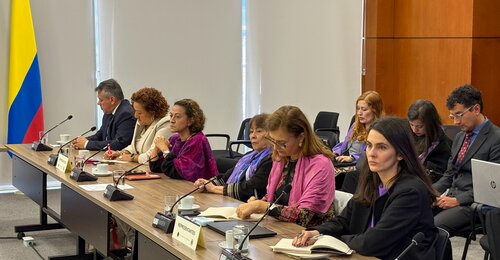Colombia
Internal armed conflict over the past 60 years has affected more than nine million people across Colombia. Guerrilla fighters, paramilitaries, drug cartels, and State forces have all been involved in territorial fighting, with severe consequences for civilians, who have been subjected to conflict-related sexual violence, enforced disappearances, killings, and internal displacement.
Conflict-related sexual violence has devastated many lives in Colombia. Approximately 90 per cent of survivors are women, with Afro-Colombian and Indigenous women specifically targeted. Perpetrated by all actors, including the State and non-state armed groups, there are upwards of 45,000 victims of conflict-related sexual and reproductive violence registered with the Victims Registry. More than 1,100 people have also been listed as being born of sexual violence. While a peace agreement was signed in 2016 between the government and the Colombian Revolutionary Armed Forces (FARC), the violence has not ceased.
GSF launched the Global Reparations Study in 2022, which identified opportunities and challenges for the implementation and fulfilment of the right to reparation for victims of sexual and reproductive violence. Following these findings, GSF began working with survivors in their fight to define and access reparations promised under the 2011 Victims and Land Restitution Law.
Project partners
Jurisdicción Especial para la Paz (JEP)
Mujeres del Plantón
Asociación de Mujeres Wiwa Abu Dzibu (ASOMUDWAZI)
Centro de Estudios UR-Intercultural – Universidad del Rosario

The Global Reparations Study on Colombia
Technical support to the Special Jurisdiction for Peace (JEP)
Since 2023, GSF has been working with victims of macro-case 05 within the Special Jurisdiction for Peace (JEP), the transitional justice judicial mechanism established by the 2016 peace agreement. The case covers multiple violations, such as rape or other forms of sexual violence committed by both FARC and state forces in parts of the Cauca and Valle del Cauca provinces between 1993 and 2016.
GSF supported the JEP in involving survivors of sexual violence in shaping a restorative sanctions project. Survivors decided on the creation of community centres where they will meet, organise, find support, and participate in healing activities. As part of the restorative sanctions approach, perpetrators will also participate in the construction of the centres. We also worked with the JEP and the Victim’s Unit to remove barriers for survivors to join the registry and access reparations.
Advocacy and technical support on the national reparations programme
After initial attempts to improve access to reparations under the Victims’ Law, in late 2024, GSF joined the Victims Unit in developing Renace (rebirth), a series of psychosocial and emotional support sessions for survivors. In 2025, the Unit carried out initial support sessions for 150 survivors across five municipalities, to be expanded nationwide with GSF support.
In addition, GSF has challenged a recent amendment of the Victims and Land Restitution Law at the Constitutional Court that threatens the ability of survivors to obtain reparation.

Supporting survivor networks
GSF provides technical support to the survivor-led grassroots organisation, Mujeres del Plantón, based in the Urabá region, to improve their capacity to claim their right to reparation.
We also work with Wiwa Indigenous women in the Sierra Nevada de Santa Marta mountains. For Wiwa survivors, the sacred connection between their bodies and the earth was disrupted by sexual violence. GSF is working with a group of Wiwa women to integrate this spiritual dimension of reparation into a macro-case, with the goal of protecting survivors’ territory, culture, and the spiritual leadership of Indigenous women. As a result, the Office of the Inspector General of Colombia filed a petition to the JEP for judicial protection for Indigenous territory and, most notably, the sacred female sites.



